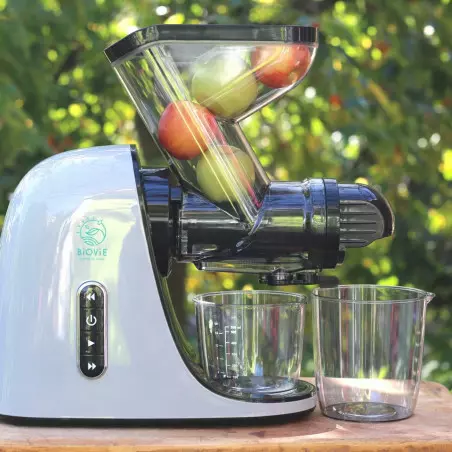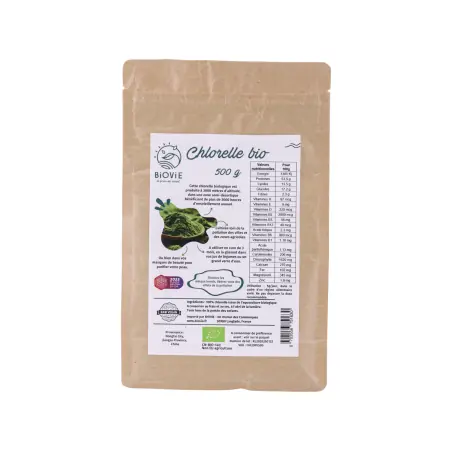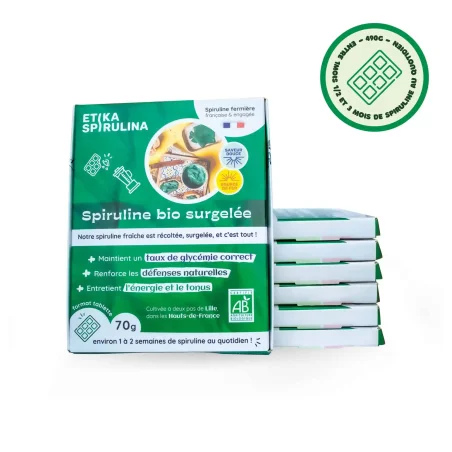The liver plays a crucial role in our body, ensuring many vital functions. However, we often neglect its health. In this article, we will explore 8 practical tips to keep your liver healthy, thus allowing you to optimize your overall well-being and vitality.
After reading this article, you will discover:
- The importance of the liver for your overall health ;
- Simple and effective tips for taking care of your liver daily ;
- How to integrate these habits into your lifestyle, in accordance with the principles of raw and organic food.
Understanding the essential role of the liver in our body
The liver is often described as the detoxification powerhouse of our body, playing a key role in maintaining good health. Responsible for more than 500 vital functions, this essential organ performs a multitude of tasks, ranging from filtering toxins to regulating chemical substances in the blood. A primary function of the liver is the natural detoxification, the process by which it neutralizes and eliminates waste and harmful substances. Supporting this function is crucial to avoid excessive strain on the liver and prevent various health issues. With this in mind, It is essential to understand how the liver contributes to metabolism and to the digestion. He transforms the nutrients the foods we consume into usable substances for energy and cell regeneration, directly impacting our vitality and overall condition.
Natural detoxification
The liver detoxification process is a complex but essential mechanism by which the liver neutralizes harmful substances and eliminates them from our body. Acting as a sophisticated filter, the liver convert the Liposoluble toxins into water-soluble compounds, thereby facilitating their excretion by the kidneys or bile. This process occurs in two main phases: the The first phase involves the oxidation, reduction, and hydrolysis of toxins., while the The second phase conjugates them to other molecules to make them water-soluble..
Supporting this natural detoxification function is crucial to avoid overburdening the liver, which could otherwise lead to a buildup of toxins in the human body, thereby compromising overall good health. A diet rich in raw foods and biological, for example, can provide the liver with nutrients and enzymes necessary to function optimally. Studies show that compounds found in fruits and vegetables, such as flavonoids and the Glucosinolates, can enhance the liver's detoxifying abilities (Journal of Agricultural and Food Chemistry 2020).
The integration of a variety of detoxifying foods, such as Crucifers and the Citrus fruits, can offer daily support to your liver processes, thereby contributing to an increased state of vitality and well-being. The adoption of these dietary practices, in accordance with the principles of theliving food and organic, not only helps to take care of this essential organ but also promotes enhanced overall health.
Metabolism and digestion
The liver plays a central role in the metabolism and the digestion, thus contributing to maintaining a healthy body. As a true biochemical laboratory, It transforms the nutrients we consume into essential compounds for energy, cell regeneration, and the proper functioning of organs. When you ingest food, the liver works tirelessly to break down fats, metabolize carbohydrates, and store the vitamins and minerals necessary for your body.
Liver enzymes play a crucial role in this transformation process. They facilitate the conversion of proteins into amino acids, and carbohydrates into glucose, thus providing an immediate source of energy. This metabolic process is essential for maintaining a stable energy level throughout the day, avoiding spikes and drops in glucose that can lead to fatigue.
In addition to managing nutrients, The liver is also responsible for the elimination of metabolic waste. It filters the blood to extract toxins, medications, and other harmful substances, and prepares them for expulsion through the bile or urinary pathways. This process is essential to prevent the accumulation of waste that could harm your health.
To support these vital functions, it is crucial to adopt a diet rich in raw and organic foods, which not only provide the necessary nutrients but also reduce the toxic load on the liver. By incorporating foods rich in enzymes, such as fresh fruits and vegetables, help you optimize the metabolic functioning of your liver, thus promoting sustainable health and vitality.

Tip 1: Adopt a diet rich in raw and organic foods
To take care of your liver and optimize its detoxification function, a good diet rich in raw and organic foods proves to be a wise choice. Raw foods are full ofliving enzymes who play a crucial role in maintaining a healthy liver. These enzymes facilitate digestion and enhance the liver's ability to metabolize nutrients, while reducing the strain on the liver caused by food toxins.
Detoxifying fruits and vegetables
Integrate some fresh fruits and detoxifying vegetables in your daily diet is an effective strategy to support liver function and promote good health. These foods, rich in antioxidants and in essential nutrients, help neutralize toxins and optimize the natural detoxification process.
The lemon, for example, is particularly beneficial due to its high content of Vitamin C and in antioxidants. Consuming lemon water in the morning can stimulate bile production, thereby helping the liver to eliminate waste more effectively. Similarly, the Beetroot is recognized for its positive effect on liver health. It contains betalain, a pigment that supports the detoxification process by helping to regenerate liver cells.
The Crucifers, such as broccoli and cauliflower, are also valuable allies. They contain Glucosinolates, which activate the liver's detoxification enzymes, thereby facilitating the cleansing of toxins. These vegetables can be easily incorporated into salads or smoothies, offering a simple and delicious way to consume these nutrients.
Incorporating these raw and organic foods not only supports your liver but also contributes to better vitality and overall well-being.
Seeds and nuts to support the liver
Seeds and nuts occupy a prominent place in a diet aimed at maintaining a healthy liver. These small nutrient powerhouses offer a multitude of benefits that can promote liver detoxification and cellular regeneration. Rich in essential fatty acids, in fibers, and in antioxidants, they effectively support liver functions.
The seeds of chia and of "lin", for example, are particularly beneficial due to their high content of omega-3 and in Soluble fibers. Omega-3s are known for their anti-inflammatory properties, which help reduce oxidative stress on the liver. Soluble fibers, on the other hand, facilitate intestinal transit and the elimination of toxins, thereby lightening the workload of this essential organ.
In addition, nuts, such as Grenoble walnuts, are an excellent source of Glutathione, a powerful antioxidant that plays a crucial role in the liver detoxification process. They also containArginine, an amino acid that helps remove ammonia from the body, a toxin that the liver must process.
By regularly incorporating these seeds and nuts into your diet, you provide valuable support to your liver while promoting better overall health. Whether in your salads, smoothies, or simply as a snack, their presence in your living food and organic will be an undeniable asset for your well-being.
To further explore ways to incorporate these beneficial foods into your daily routine, consult our "Complete Guide for a Balanced and Raw Breakfast".

Tip 2: Stay properly hydrated
Thehydration is an essential element for the proper functioning of our liver, often neglected in our daily routine. Indeed, water plays a crucial role in the detoxification process by helping to dilute and eliminate toxins processed by the liver. Good hydration also facilitates the transport of nutrients to the cells and the expulsion of waste through the kidneys and the digestive system. To maintain a healthy liver, it is recommended to regularly consume water throughout the day.
Lemon water, an ally for the liver
The simple act of starting your day with a glass of lemon water can have beneficial effects on liver function. Lemon, rich in vitamin C and antioxidants, stimulates the production of bile, which is essential for digestion and fat metabolism. Incorporating this morning drink into your routine can help cleanse the liver and enhance its detoxifying abilities. To learn more about other detoxifying recipes, discover our recipe forGinger + Lemon Water with 6 Benefits.
Detoxifying green juices
Green juices are a true source of vitality for your liver, thanks to their high concentration of essential nutrients and antioxidants. These energizing drinks harness the benefits of raw and organic vegetables to provide powerful support for liver function. By incorporating ingredients such as cucumber, spinach, celery, or parsley, you provide your body with elements that promote the natural detoxification of the liver.
The Cucumber is particularly hydrating and helps to eliminate toxins from the body, while the Spinach are overflowing with chlorophyll, a substance known for purifying the blood and supporting liver health. The celery, on the other hand, is rich in flavonoids, which enhance the liver's detoxification abilities by reducing oxidative stress. Together, these ingredients create a revitalizing blend that helps neutralize toxins and boost your metabolism.
To prepare a detoxifying green juice, start by thoroughly washing your organic vegetables. Then, put them through the juicer.Juice extractor to maximize the nutritional benefits. For a touch of flavor and an extra dose of vitamin C, add a few drops of lemon juice. The latter stimulates the production of bile, which is essential for proper digestive and liver function.
Green juices are not only a healthy drink but also a delicious way to improve your overall well-being. By incorporating them into your morning routine or as a refreshment during the day, you effectively support your liver while promoting a vibrant and eco-friendly diet.

Tip 3: Incorporate superfoods into your diet
To support and revitalize liver function, the integration of superfoods Incorporating these foods into your daily diet is an effective strategy. These foods, rich in nutrients and beneficial compounds, can enhance detoxification and protect your liver from damage. Among the most recommended superfoods are milk thistle, the chlorella, and the spirulina. These natural allies are recognized for their protective properties and their ability to enhance liver health by facilitating the elimination of toxins and reducing oxidative stress.
Milk thistle, protector of the liver
The milk thistle is one of the most renowned superfoods for its benefits on the liver. Its active substance, the silymarin, is a powerful antioxidant that helps protect liver cells from damage caused by toxins. In addition to supporting the regeneration of liver cells, milk thistle also enhances detoxification by increasing bile production. Including this superfood in your routine can be done through supplements or in the form of herbal tea, offering a natural and effective solution for maintaining a healthy liver.
Chlorella and spirulina for detox
The chlorella and the spirulina, often cited among the most powerful superfoods, play a major role in detoxification and liver protection. These two microalgae are rich in essential nutrients that help purify the body and strengthen liver health.
The chlorella is particularly renowned for its ability to bind and eliminate heavy metals and other toxins from the body. Thanks to its unique cell wall, it acts like a magnet for impurities, facilitating their expulsion and thus reducing the liver's toxic load. Integrating chlorella in your diet can not only support the detoxification process but also improve your immune health and energy.
On the other hand, the spirulina is an excellent source of complete proteins, antioxidants, and B vitamins, which all play a crucial role in cellular repair and the reduction of oxidative stress. These properties are particularly beneficial for the liver, as they support its ability to regenerate damaged cells and defend against damage caused by environmental toxins.
Incorporate these microalgae in your Smoothies, salads, or in the form of supplements can offer significant support to your liver. However, it is crucial to ensure the quality of the products you consume. To learn more about the quality and safety of spirulina, check out our article: Spirulina and microcystins: check the quality !.
By incorporating these superfoods into your daily routine, you not only strengthen your liver health but also contribute to increased overall vitality and lasting well-being.
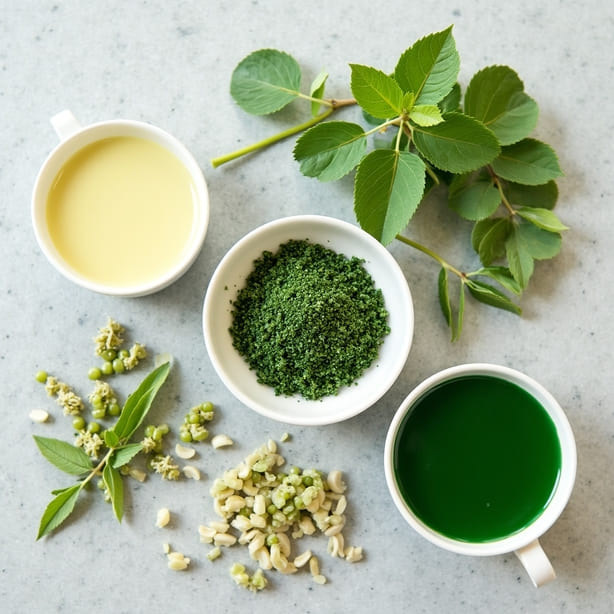
Tip 4: Practice intermittent fasting
The intermittent fasting establishes itself as an effective method for maintaining a healthy liver by providing it with necessary rest periods to optimize its functions. This practice involves alternating periods of fasting with periods of feeding, allowing the liver to draw on its fat reserves to produce energy while reducing digestive strain. Studies have shown that intermittent fasting can improve the liver's resistance to toxic assaults and stimulate theautophagy, a crucial process of cellular cleaning (Cell Metabolism, 2016).
By integrating the intermittent fasting to your lifestyle, you can not only support liver detoxification but also promote better regulation of your metabolism and more efficient use of nutrients. Adopting this practice gradually and respecting your body's signals is essential to reap all the benefits while minimizing the risks.
These different approaches allow you to choose the one that best aligns with your daily routine and health goals. By adopting intermittent fasting, you join a growing community of people who prioritize natural methods to optimize their liver health and overall well-being.
The different methods of fasting
Adopt the intermittent fasting can be a beneficial transformation for your health, but choosing the method that best fits your lifestyle is essential for lasting success. Several approaches can be considered, each with its own advantages to support liver function and overall well-being.
- The 16/8 fasting is one of the most popular methods. It involves fasting for 16 hours of the day, leaving an 8-hour window to consume your meals. This method is often adopted by those who wish to incorporate fasting without radically disrupting their daily routine. It allows the liver to rest and refocus on its detoxification and fat metabolism functions.
- The 5:2 fasting propose an alternative rhythm, where one eats normally five days a week and significantly reduces calorie intake for two non-consecutive days. This flexible model may be more appealing to those who prefer not to fast daily, while offering the liver the opportunity to regulate its functions and improve insulin sensitivity.
- Intermittent fasting, where one alternates between days of complete fasting and days of normal meals, may be suitable for those seeking faster results. However, it is important to ensure that this method is appropriate for your personal health and to consult a professional if you have medical concerns.
- Finally, spontaneous fasting, where skipping a meal from time to time while listening to one's body can be a more intuitive way to practice fasting, especially for beginners or those who want to avoid rigid structures.
Whatever model you choose, the essential thing is to adapt it to your lifestyle and specific needs. By adopting a gradual approach and paying attention to your body's signals, intermittent fasting can become a powerful tool for maintaining a healthy liver and supporting lasting vitality.
Precautions and Tips for a Safe Fast
Intermittent fasting, although beneficial for the liver and the entire body, requires a thoughtful and gradual approach to be practiced safely. It is crucial to listen to your body and respect its signals, especially at the beginning of this practice. Fasting should never be synonymous with excessive deprivation, but rather with a dietary rebalancing that promotes well-being.
Here are some tips for an effective and safe intermittent fasting:
- Start gradually : If you are new to fasting, start by gradually extending your fasting periods. For example, begin with a 12-hour fast, then move to a 14-hour fast, until you reach the duration that suits you best.
- Stay hydrated : During fasting periods, make sure to drink enough water to maintain good hydration. You can also consume herbal teas or lemon water to support the detoxification process.
- Listen to your body : It is essential to pay attention to your body and recognize signs of hunger or fatigue. If you experience symptoms such as dizziness, weakness, or excessive irritability, it may be necessary to break the fast or adjust its duration.
- Consume nutrient-rich foods During the periods when you eat, make sure to consume foods rich in nutrients and fiber, such as fruits, raw vegetables, and seeds, to support your liver and overall health.
- Consult a healthcare professional : Before starting intermittent fasting, it is advisable to consult a healthcare professional, especially if you have pre-existing medical conditions or if you are taking medications.
By adopting these precautions, intermittent fasting can become a beneficial practice to optimize liver function and improve your overall health.

Tip 5: Reduce your exposure to toxins
Reducing exposure to toxins is an important lever for maintaining a healthy liver and preventing its excessive strain. Our environment is full of potential sources of toxins, ranging from air pollutants to chemicals present in our daily lives. By identifying and minimizing these sources, you can lighten the detoxification burden on your liver, thereby promoting better overall health.
Toxins can come from many aspects of our daily life. Think about traditional household products, often filled with harsh chemicals, or conventional cosmetics that contain potentially harmful ingredients. Even non-organic foods can be loaded with pesticides and other contaminants. The key to protecting your liver is to be aware of these dangers and make healthier and more sustainable choices. To do this, prioritize natural and organic alternatives that respect your body and the environment.
Natural household products
The use of natural household products is an excellent first step to reduce the toxic load on your liver.. Classic cleaners, rich in chemical compounds like ammonia or bleach, can be replaced by homemade solutions or eco-friendly products available on the market. For example, white vinegar, baking soda, and essential oils such as tea tree oil or lemon oil, are powerful and safe alternatives for cleaning your home without compromising your health.
By choosing natural household products, you not only minimize direct exposure to toxins but also contribute to a healthier home environment that is more respectful of the ecosystem. It is a conscious choice that supports liver function by limiting the harmful substances the liver has to process, while aligning with a sustainable and responsible lifestyle.
The importance of organic cosmetics
Beauty and personal hygiene products play a significant role in our daily exposure to toxins, often underestimated. Conventional cosmetics can contain a variety of chemical substances, such as parabens, the phthalates, and the Synthetic perfumes, which are absorbed by the skin and increase the toxic load that the liver has to manage. These chemical-synthetic components are not only potentially harmful to health, but they also put excessive strain on the liver, as it has to work more intensively to break down and eliminate the accumulated toxins.
Adopt organic cosmetics is an essential step to lighten the toxic burden on your liver. Organic and natural products are formulated with plant-based ingredients, without synthetic additives, and are often enriched with beneficial nutrients. By choosing certified organic cosmetics, you not only limit your exposure to toxins but also enhance your overall well-being. These products adhere to ethical and ecological standards, promoting a healthier and more sustainable beauty.

Tip 6: Manage your stress
Managing stress is a crucial step to maintaining a healthy liver. Indeed, chronic stress can have a direct impact on liver function by increasing the production of certain hormones that excessively strain the liver. When you are stressed, your body releases hormones such as Cortisol and theAdrenaline, which can lead to a buildup of toxins and disrupt detoxification processes. This overload can potentially weaken the liver and harm your overall well-being.
Adopt effective strategies to manage the Stress can not only improve your mental health but also support your liver health. Practicing relaxation exercises regularly, such as meditation or deep breathing, is a recognized method for reducing stress and promoting cellular regeneration. These simple techniques help restore hormonal balance and reduce the strain on the liver, while also improving your quality of life.
Meditation and deep breathing
The meditation and the deep breathing are accessible and powerful techniques for reducing daily stress, thereby promoting a healthy liver. These seemingly simple practices play a crucial role in regulating the Stress. By incorporating these exercises into your routine, you not only help stabilize your emotional state but also support the liver's detoxification and metabolism functions.
Meditation offers a moment of calm and refocusing, allowing for a reduction in the production of cortisol, one of the stress hormones that can disrupt the liver. Practicing meditation does not require any specific equipment or particular setting: a few minutes daily are enough to feel its benefits. Sit comfortably, close your eyes, and focus on your breathing. Let thoughts come and go without clinging to them. This mental break helps restore hormonal balance and promotes better emotional regulation.
The deep breathing, on the other hand, is an easy technique to adopt anywhere, at any time of the day. By focusing on your slow and deep inhalations and exhalations, you activate the parasympathetic nervous system, which induces a state of relaxation. This can be particularly beneficial before going to bed or during moments of intense stress. Try breathing in while counting to four, holding that breath for an additional four counts, then slowly exhaling while counting to six. This simple method facilitates blood oxygenation and reduces the workload of the liver.
By regularly incorporating meditation and deep breathing In your life, you create an internal environment conducive to health and well-being, while providing essential support to your liver.
The importance of quality sleep
A Sleep Quality is essential to maintain a healthy liver and promote its regeneration. During sleep, our body enters a phase of repair and detoxification, vital processes that allow the liver to regenerate and more effectively neutralize the toxins accumulated throughout the day. Insufficient or poor-quality sleep can disrupt our body's circadian rhythm, thereby compromising these critical functions.
To improve the quality of your Sleep and thus support the health of your liver, it is crucial to adopt certain habits. First, establish a regular sleep routine by going to bed and waking up at the same time each day. Create a restful environment by limiting exposure to blue light from screens before bedtime, and opting for a dark and quiet bedroom. Practicing relaxation techniques, such as deep breathing or guided meditation before sleep, can also promote faster falling asleep and more restorative sleep.
By incorporating these strategies into your daily routine, you enable your liver to maximize its regeneration and detoxification capabilities, thereby contributing to your overall well-being.

Tip 7: Move regularly
ThePhysical activity plays a crucial role in maintaining a healthy liver, and incorporating a regular exercise routine can have notable beneficial effects on liver function. Moving regularly helps not only to improve Blood circulation, but also to stimulate the metabolism, thus facilitating the elimination of toxins and reducing the workload of the liver. Furthermore, physical exercise contributes to the regulation of the weight Bodily, an important factor in preventing liver overload, particularly by preventing the accumulation of fat around the liver, known as hepatic steatosis.
Gentle exercises to stimulate the liver
Incorporating gentle exercises into your daily routine is an excellent way to stimulate the liver without stressing it. Among the most beneficial gentle exercises are Yoga, the walk, and the tai chi, each offering unique benefits for liver health.
Yoga : Yoga is particularly appreciated for its relaxing properties and its ability to promote better digestion. Certain poses, such as the seated twist or the cobra pose, specifically help stimulate blood circulation to the liver, thereby supporting its detoxification process. By incorporating a regular yoga practice, you can increase your body's flexibility while reducing stress, a key factor in preventing overworking the liver.
Walk : Walking, on the other hand, is a simple yet highly effective activity. It improves blood circulation and helps maintain a healthy weight, thereby reducing the risk of fat accumulation around the liver. A daily 30-minute walk can already have a significant impact on your well-being and liver health. Enjoy these moments for yourself. reconnect with nature, a bonus for your mental and physical health.
Tai Chi : Tai chi, an ancient Chinese practice, combines slow and graceful movements with deep breathing, helping to harmonize the body and mind. This discipline is known for improving energy circulation and strengthening the immune system. By practicing tai chi, you contribute to stress reduction and improved blood circulation, two essential elements for a healthy liver.
These gentle exercises do not require specific equipment and can be adapted to different fitness levels, making them accessible to everyone. The important thing is to find an activity you enjoy and incorporate it regularly into your life to reap all the benefits.
The importance of regularity
To maximize the benefits of gentle exercises on liver health, the key lies in Regularity. Integrating physical activity into your daily routine should not be seen as a constraint, but rather as an opportunity to take care of yourself. Here are some tips to achieve this:
- Start slowly : Start with short sessions, like 10 minutes a day, then gradually increase the duration as you feel more comfortable.
- Be consistent : Choose specific times in your day to practice exercise, whether it's in the morning to start the day off right, or in the evening to relax after work.
- Vary the pleasures : Alternate between different activities to avoid monotony and to engage various muscle groups. This will maintain your motivation and make exercise more enjoyable.
- Find a partner Practicing with a friend or family member can make the activity more engaging and encourage you to stay committed.

Tip 8: Use plants and essential oils
Explore the power of plants and of the essential oils can offer valuable support for maintaining a healthy liver. These natural remedies, used for centuries, have detoxifying and regenerative properties that can help protect the liver and improve its functions. By incorporating certain plants and essential oils into your routine, you can enhance the detoxification process and promote liver health in a gentle and natural way.
Detoxifying herbal teas
Detoxifying herbal teas are a gentle and pleasant way to support liver function and promote good liver health. By using plants with purifying and regenerative properties, these teas can help to Eliminate toxins, , stimulate bile production, and improve digestion. .
Here are three herbal tea recipes that can support you in your detoxification process:
1. Milk thistle herbal tea:
Milk thistle is a plant known for its ability to protect and regenerate liver cells thanks to silymarin. To prepare this herbal tea, steep a tablespoon of milk thistle seeds in 250 ml of hot water for 10 minutes. Filter and savor this beneficial beverage daily, ideally after meals to support digestion.
2. Dandelion tea :
Dandelion root is used to stimulate bile production, which is essential for fat digestion, and for its diuretic properties that help eliminate toxins. For optimal effect, steep a teaspoon of dried dandelion root in a cup of boiling water for 15 minutes. Drink this herbal tea twice a day to maximize its benefits.
3. Turmeric and ginger herbal tea :
Turmeric has anti-inflammatory and antioxidant properties that are beneficial for the liver, while the Ginger promotes digestion and circulation. To prepare this herbal tea, mix half a teaspoon of turmeric powder with a few slices of fresh ginger in 300 ml of water. Boil the mixture for 10 minutes, then strain before drinking. Enjoy this herbal tea once a day to support liver health.
Integrating these herbal teas into your daily routine can contribute to sustainable liver support and overall better health. To maximize the benefits, choose ingredients from organic farming, thus preserving the quality and effectiveness of the plants used. These simple practices, combined with a balanced and vibrant diet, can play a key role in your general well-being and natural detoxification process.
Hepatic essential oils
Essential oils can be powerful allies in supporting liver health, thanks to their unique therapeutic properties. However, it is essential to use them correctly to maximize their benefits while minimizing potential risks.
Here are some essential oils that are particularly beneficial for liver function and tips for using them safely.
Lemon essential oil
Lemon essential oil is widely recognized for its purifying and detoxifying properties. It can:
- Stimulate bile production,
- Facilitate the digestion of fats,
- Support the liver detoxification process.
To enjoy its benefits, diffuse a few drops in an essential oil diffuser to create a purifying and refreshing environment.This method ensures safe use by avoiding direct ingestion.
Rosemary essential oil
Rosemary is a valuable medicinal plant for the liver. Rosemary essential oil can:
- Stimulate blood circulation,
- Strengthen bile production,
- Improve digestion,
- Support liver metabolism.
For safe use, dilute rosemary essential oil in a carrier oil such as jojoba oil or sweet almond oil before any skin application. Gently massage this preparation onto the liver area to promote its absorption.
Peppermint essential oil
Known for its digestive properties, peppermint essential oil can also:
- Support the liver by improving blood circulation,
- Help with the elimination of toxins.
As with any essential oil, dilute it in a carrier oil before applying it to the skin and avoid contact with the eyes and mucous membranes.
Safety tips
- Dilution and skin test : Always dilute essential oils in a carrier oil to avoid skin irritation. Perform a patch test on a small area before a wider application.
- Consult a professional : Before incorporating essential oils into your routine, consult a healthcare professional, especially if you have pre-existing medical conditions or if you are pregnant.
- Internal use : The internal use of essential oils is generally not recommended without the advice of a professional, due to potential health risks.
By using these essential oils with caution, you can enhance your holistic health approach while supporting your liver function. This choice aligns with a respectful and responsible approach to your well-being and environment, reflecting the principles of a healthy and natural life.
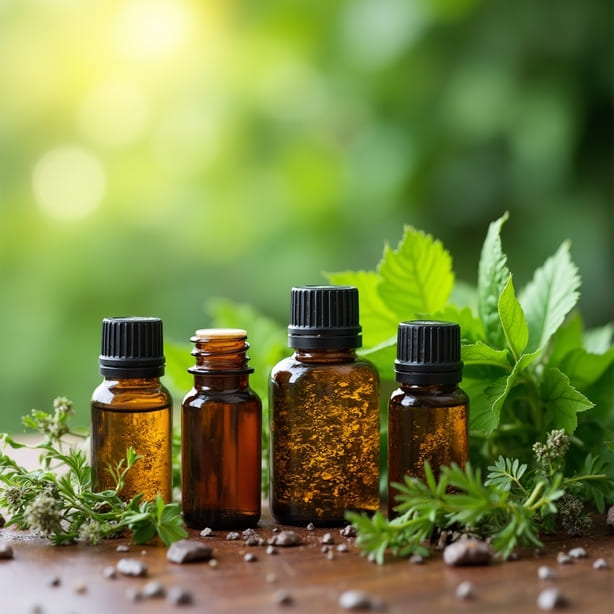
Your questions and our answers (FAQ)
Why is it important to maintain good liver health?
The liver plays a crucial role in our body by performing vital functions such as detoxifying toxins, regulating chemicals in the blood, and converting nutrients into usable energy. A healthy liver is essential to avoid overexertion and prevent various health issues.
Which foods are beneficial for liver function?
To support optimal liver function, it is recommended to consume raw and organic foods such as leafy green vegetables, lemons, beets, and cruciferous vegetables. These foods are rich in antioxidants and enzymes that help detoxify the liver and improve digestion.
How can intermittent fasting support liver health?
Intermittent fasting gives the liver necessary rest periods to optimize its functions. It helps to tap into fat reserves to produce energy and promotes the regulation of metabolism. Studies show that it can improve the liver's resistance to toxic assaults and stimulate autophagy, a crucial process of cellular cleaning.
What are the best plants to detoxify the liver?
Plants such as milk thistle, dandelion root, and turmeric are particularly beneficial for the liver. Milk thistle protects liver cells, dandelion stimulates bile production, and turmeric has anti-inflammatory properties. These plants help support detoxification and liver health.
Can essential oils be beneficial for liver health?
Yes, certain essential oils like lemon and rosemary can support liver function. Lemon essential oil is purifying and detoxifying, while rosemary essential oil stimulates bile production and improves blood circulation. However, it is important to use them correctly, usually diluted in a carrier oil, and to consult a healthcare professional if necessary.
How to reduce exposure to toxins to preserve liver health?
To reduce exposure to toxins, prioritize natural or organic household and cosmetic products. Traditional cleaners can be replaced with white vinegar and baking soda, while organic cosmetics eliminate exposure to parabens and other harmful chemicals.
What physical exercises are recommended to support liver health?
Gentle exercises such as yoga, walking, and tai chi are perfect for stimulating liver function without stressing it. These activities improve blood circulation, promote digestion, and help maintain a healthy weight, which is essential to avoid liver overload.
How does stress affect liver function?
Chronic stress can increase the production of hormones like cortisol, which puts excessive strain on the liver. Managing stress through relaxation techniques such as meditation and deep breathing can help reduce this burden and support liver health.
Why is hydration important for the liver?
Good hydration is essential because water helps to dilute and eliminate toxins processed by the liver. Drinking water regularly, and consuming beverages like lemon water, can effectively support liver detoxification function.





